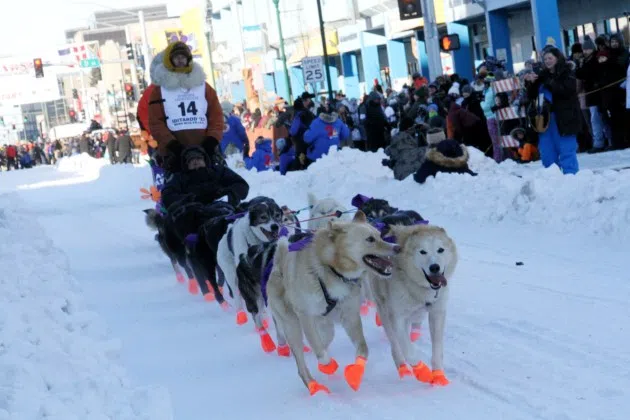ANCHORAGE, Alaska (AP) — Claims of violence against women are roiling the world’s most famous sled dog race — Alaska’s Iditarod — with officials disqualifying two top mushers this week and then quickly reinstating one of them on Friday, days before the start.
The upheaval began last week, when the Iditarod Trail Committee, the race’s governing body, sent an email to all competitors saying it had been informed of several accusations concerning violence against and abuse of women within the mushing community.
“The ITC Board cannot tolerate such conduct by anyone affiliated with the Iditarod,” the email said.
On Monday, the committee held an emergency meeting and disqualified the 2023 rookie of the year, Eddie Burke Jr. Burke had been facing single felony and misdemeanor assault charges after his then-girlfriend told police in May 2022 that he had strangled her to the point she almost lost consciousness, according to the Anchorage Daily News.
The committee offered no explanation of Burke’s disqualification beyond noting a rule that mushers “will be held to a high standard of personal and professional conduct.”
Two days later, the State of Alaska dismissed the charges because the former girlfriend declined to participate in the case, Alaska Department of Law spokesperson Patty Sullivan said Friday in an email to The Associated Press.
“After a thorough review of the evidence in this investigation, the Department of Law determined that it would be unable to prove the assault charges beyond a reasonable doubt to a trial jury,” she wrote.
On Friday, Burke was reinstated. He did not immediately respond to messages seeking comment.
“Additional information was provided to the Iditarod Trail Committee Board today regarding Eddie Burke Jr.,” the committee said in a news release. “Upon reviewing this information, the Board voted to reinstate Mr. Burke as a competitor in the 2024 Iditarod.”
In the meantime, though, the committee on Thursday night disqualified 2022 champion Brent Sass — again, without offering any details about why. No criminal cases against Sass appear in online Alaska court records.
“I am beyond disappointed with the decision the Iditarod has reached to disqualify me,” said a statement posted Friday to the Facebook page of Sass’ kennel. “The anonymous accusations that have been made against me are completely false.”
It was not immediately clear what accusations Sass was referring to. But on Friday, an Anchorage attorney, Caitlin Shortell, issued a statement saying, “More than one Alaskan has sought legal advice and representation from our law firm based on their reports of sexual assault by a dog musher who was disqualified today by the Iditarod” — an apparent reference to Sass.
“Our clients retained counsel and sought to remain anonymous because of the high risk that disclosure of their identities and experiences would subject them to retraumatization, invasion of privacy, litigation, and potential violence by their assailant or others,” the statement says.
Retired musher Dan Seavey of Seward said the situation could be viewed either as a black mark against the race, or as race officials having scruples and upholding them.
“Charges are easy to bring against anybody, but to prove them is another thing,” said Seavey, 86, a former board member who ran the Iditarod five times, including finishing third in the very first race.
“I don’t think the race should get involved in out-of-race squabbles,” he said.
Mike Williams Sr. participated in 15 Iditarod races between 1992 and 2013. The 71-year-old Yup’ik leader from the southwestern Alaska community of Akiak ran the last race alongside his son, Mike Williams Jr. He also considers both Sass and Burke friends.
The top concern for the race officials should be making sure dogs are well cared for, he said, and he doesn’t believe it’s necessary for the Iditarod to be policing mushers’ lives. Instead, each musher needs to make their own decisions and face the consequences if they get into legal trouble.
“In anything that we do, we are innocent until proven guilty,” Williams said.
This year’s 1,000-mile (1,609-kilometer) race across the Alaska wilderness begins March 2 with the ceremonial start in Anchorage. The competitive start comes the next day, about 75 miles (121 kilometers) north of Anchorage.
Sass’ removal leaves 39 mushers remaining in this year’s field. Last year, 33 mushers started, the fewest since the Iditarod was first held in 1973.
It’s not the first time Sass has been disqualified from the Iditarod.
In 2015, he was removed from the race after officials found he had an iPod Touch with him on the trail, a violation of race rules barring two-way communication devices. Even though the iPod Touch was not a phone, he could have communicated with others when it connected to the Internet, officials said.
___
All contents © copyright 2024 Associated Press. All rights reserved.
Latest News







